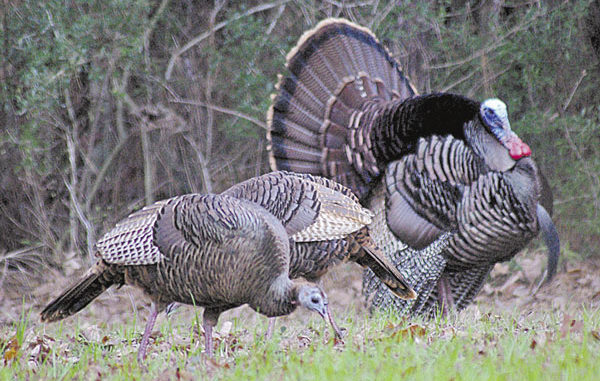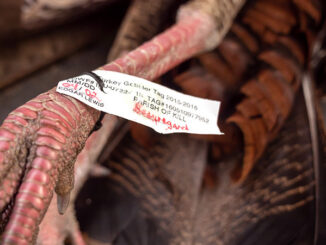
It’s never fun spending the holidays at the hospital, but I guess it is worse when you know a loved one is not coming home. My wife’s father, Robert H. Parks Sr. (better known as PawPaw), died on New Years Day. He was 95 years old and had lived a full life for which we are very thankful. PawPaw was a veteran of WWII, and served in the U.S. Navy in the Pacific. He was buried on my wife’s birthday at the Port Hudson National Cemetery.
Now all of our family members who served during WWII have passed on as have so many of the men from what is known as the Greatest Generation. These were the men who gave themselves for the cause of freedom.
When the war was over, they came home to the fields, woods and waters that they had left behind for those years, and were ready to resume their outdoor activities. This was the generation that is responsible for initiating the wildlife-restoration programs in the late 1940s and ’50; this is the generation that has provided the game populations that my generation, the Baby Boomers, have enjoyed for more than 50 years.
One of the success stories concerning this wildlife restoration effort is that of the Eastern wild turkey.
Now that the deer hunting is over, the members of the Tenth Legion are beginning to think about March and the 2011 turkey season. The Tenth Legion is that elite group of hunters that Tom Kelly wrote about in his book titled Tenth Legion. He considers turkey hunters to be the elite group of individuals who make up the hunting community. Turkey hunters are at the top and the deer hunters are at the bottom.
Needless to say he doesn’t have much good to say about those of us who chase those four-legged beasts who eat up the seedlings in a forest without regard to the consequences. His addiction is for that majestic game bird that, as he pens it, can lead to very hard feelings among friends and family members. If you hunt turkeys you know exactly what he is talking about, and if you hunt turkeys you know the 2011 season opens statewide on March 19. If you don’t know that it does, my advice to you is to not worry about it and go fishing. Those of us who do know will carry on without you.
Now is the time to start looking through the turkey pack and checking on gear that has been idle for the fall and winter. Louisiana did have a fall turkey season on a WMA this past year so some of you who were selected for this lottery did not have to put the pack away. If you are going to hunt the WMA lottery hunts this spring, the deadline for receiving applications is Feb. 3, so you better get busy. Some WMAs will be open for hunting to all hunters during the season.
The Statewide Turkey Youth Hunt is March 12-13, which is also the date for hunters who are physically challenged. Some WMAs will have youth hunts on other dates, so check the Louisiana Turkey Regulations for the exact information, or visit the LDWF website at www.wlf.louisiana.gov.
Another way turkey hunters can make ready in February is to attend the Louisiana 2011 Turkey Calling Contest on Feb. 26 at Bowie Outfitters in Baton Rouge. Heck, if you think you can really talk turkey, you might want to participate in the contest. The winner of the Senior Division will represent Louisiana, and attend the National Calling Contest in Nashville, compliments of the Louisiana NWTF. The other divisions that persons can enter include an Open Division (residents and non-residents), an Amateur Division, an Intermediate Division (ages 16-20) and a Jake Division for the youngsters (ages 15 and younger). There will be a separate Owl Hooting Contest and a Gobbling Contest.
Winners in all of the divisions and contests will receive prizes, and in the adult divisions winners also receive cash prizes. Bowie will also have prize drawings at the store during the day, so everyone who attends has a chance to win something along with free food and drinks. There is a contest registration fee, and participants must be a current member of the NWTF. For more information, call 225-766-1200.
Another way to make ready for the spring turkey season is to attend the Wild Turkey Seminar on Feb. 25, the day before the calling contest. This event will take place at the LDWF Waddill Wildlife Education Center on Flannery Road in Baton Rouge. The seminar begins at 6 p.m., and there will be free food and drinks along with excellent turkey presentations for adults and separate activities for the youngsters, who will learn how to talk turkey and will also be given prizes.
The theme of the seminar is Managing Wild Turkeys in Louisiana. This is an opportunity for landowners and hunting clubs to learn about wild turkey management on private lands. Don Reed, wildlife biologist with the LSU Extension Service, will speak about supplemental and native grass plantings for turkeys; Luke Lewis, NWTF regional biologist, will talk about the new Longleaf Pine Program that is available to landowners; Jimmy Stafford and Mike Perot, LDWF biologists, will talk about the current turkey programs available from LDWF and the status of the wild turkey in our state, and I will talk about landscape turkey management for small landowners.
Stafford has put together a 2010 Louisiana Wild Turkey Report, which is a cooperative project between LDWF and NWTF with the State Chapter of NWTF funding the publication. He sent me a copy of it, and it is very well done and provides good information for individuals who hunt turkeys.
As you should know, all persons who hunt turkeys are required to obtain turkey tags prior to hunting, and all harvested toms are to be reported to LDWF with the hunter being given a validation number that he writes on his license.
The reported harvest from the tagging program in 2010 was 1,876 gobblers. The Annual Harvest Survey that LDWF conducts every year with persons who purchased a small-game hunting license and a selected number of lifetime license holders reported an annual average harvest for the past five years of 8,400 gobblers. This is a lot more than the bird harvest from the turkey tag program. Either the harvest survey is over-estimating the harvest or hunters are not reporting kills.
Having worked with this harvest survey for 10+ years, I always thought both the deer harvest and especially the turkey harvest were too high. The survey is statistically sound, but results from such programs are only as good as the numbers used to produce them.
Usually only about 150 gobblers are reported on the survey from hunters, and the program then generates the estimated harvest of 8,000 birds. If the tag program harvest is low because hunters are not reporting their kills, this is a slap in the face to the generation that not only paid the price for freedom, but worked hard to provide us with the wildlife populations that we now enjoy.
If you hunt turkeys and do not report your harvest, then you have no claim in being part of the Tenth Legion.


